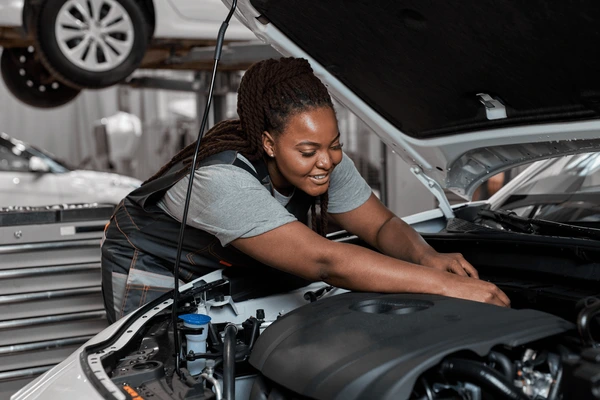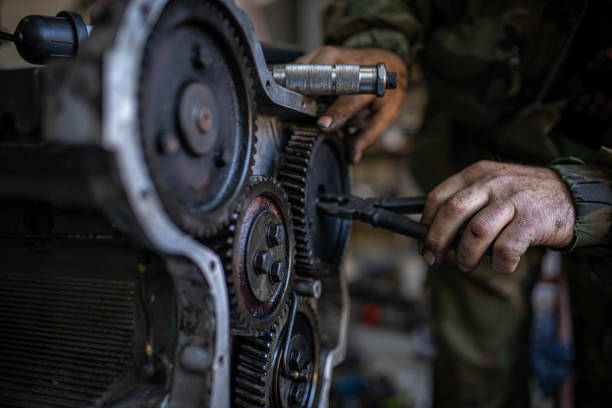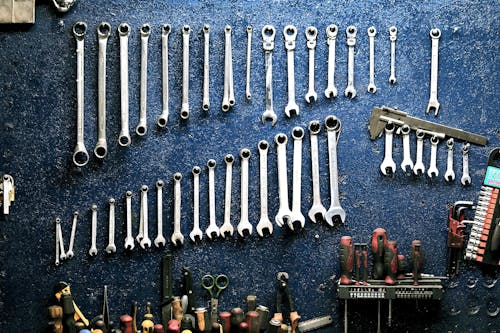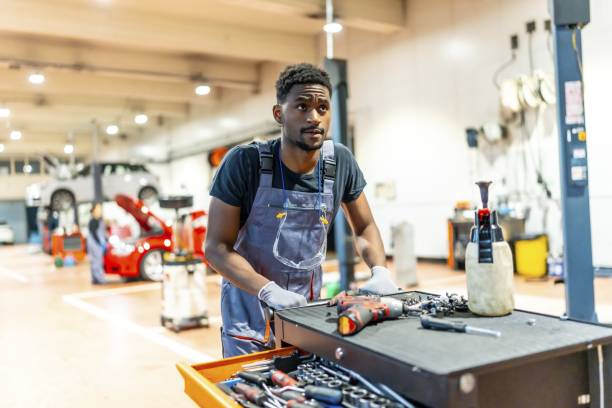If you are thinking about starting your car mechanic shop in Nigeria? It’s not a bad idea, Auto mechanic is an exciting venture that not only offers the potential to make a great living but also helps solve a huge need in the community.
With so many vehicles on the road and a growing number of car owners, there’s never been a better time to start your own mechanic business. But where do you begin? How do you make sure your shop stands out from the competition and brings in customers?
This guide will walk you through all the essential steps to start a profitable mechanic shop, even if you’re a beginner. Let’s dive into the details and make your dream of owning a mechanic shop a reality!

What is a Mechanic Shop
A mechanic shop is where cars, motorcycles, and other vehicles are repaired and maintained. It’s where mechanics work to fix problems like engine issues, oil leaks, brake failures, and other faults that can stop your car from moving well.
In Nigeria, we also call it a “mechanic workshop” or “motor garage.” It’s where you go when your car starts making strange sounds, refuses to start, or needs servicing like an oil change, wheel alignment, or fixing of AC.
Mechanic shops are very important because they help us keep our vehicles working properly, so we can move around safely for business, work, or family matters.
Reasons Why You Should Consider Opening a Mechanic Workshop in Nigeria
1. High Demand for Vehicle Repairs
Every day, thousands of cars, bikes, and buses are on Nigerian roads, and many of them develop faults due to bad roads, old parts, or poor maintenance. A mechanic workshop will always have customers, especially in busy areas. People need reliable mechanics they can trust.
2. Low Entry Barrier (Learn and Start Small)
You don’t need a university degree to become a mechanic. You can learn the skills through apprenticeship or vocational training online like the “PAN Nigeria“. Even with a small space and basic tools, you can start your workshop and grow over time.
3. Opportunity for Daily Income
Unlike some businesses that wait till month-end, mechanics can earn money daily. Customers often pay instantly for services like oil changes, brake repairs, or battery replacements, making it a great option for steady income.
4. Room for Expansion and Specialization
Once you start a workshop, you can add more services like:
- Auto-electrical (Rewire)
- AC repairs
- Spray painting
- Diagnostic services
- Spare parts sales This helps you grow into a full-service auto center and employ more people.
5. Skill-Based Business That Builds Trust and Reputation
When you’re good at what you do, customers will recommend you. In Nigeria, word of mouth is powerful. If you treat people fairly and fix their cars well, you’ll gain loyal clients, even car owners from other towns will find you.
Related Posts:
- Shoe-making Business in Nigeria: How to Make and Sell Shoes
- How to Launch a Delivery Service Business in Nigeria
- How to Start and Run a Barbing Salon in Nigeria
- How to Start a Laundry and Dry Cleaning Business in Nigeria
Categories of Auto Mobile Mechanics in Nigeria
1. Engine Mechanic
Also called a “motor mechanic”, this person specializes in diagnosing and repairing engine problems. They handle:
- Engine overheating
- Oil leaks
- Piston or crankshaft issues
- Complete engine overhauls
They’re the most commonly found mechanics in local workshops.
2. Auto Electrician (Rewire)
These mechanics focus on the electrical and wiring systems of vehicles. They deal with:
- Car ignition issues
- Lighting problems (hea+dlights, brake lights)
- Alternator faults and Battery
- Wiring of sound systems, alarms, and trackers
- Central locking systems and Power windows
3. Vulcanizer
A vulcanizer handles tire-related services such as:
- Fixing punctured tires
- Air pumping
- Wheel balancing
- Tyre patching and replacement
This is often a roadside service and can be started with minimal capital.
4. Panel Beater
Panel beaters repair and reshape damaged car bodies. Their work includes:
- Fixing dents and scratches
- Welding broken car parts
- Replacing damaged doors, bumpers, or bonnets
- Preparing bodywork for spray painting
5. Spray Painter
These professionals focus on car painting and finishing. They:
- Repaint faded or damaged cars
- Customize vehicle colors
- Apply protective coatings
- Handle paint corrections and polishing
6. AC Mechanic
Specializes in vehicle air conditioning systems. Services include:
- Refilling gas
- Fixing AC compressors
- AC filter replacement or cleaning
- Solving cooling system faults
7. Diagnostic Technician
Modern vehicles use computers. This mechanic uses scanning tools to detect faults in:
- Engine control systems
- ABS (brake systems)
- Airbags
- Sensors and fuel systems
They are more common in high-end or tech-equipped garages.
As a mechanic who wants to start a workshop, you can specialize in any area or you can have general knowledge and also employ workers who are good in each aspect just to let your workflow and to deliver a professional service to your client.

How to Start a Car Mechanic Shop in Nigeria
Now that you know the benefits you can derive from starting a mechanic workshop, let’s know how to set it up from the ground:
1. Conducting Market Research
Before opening your mechanic shop, it’s crucial to understand the local market. Think of it as the first step to ensuring your shop is needed and can thrive.
A. Identify the Demand in Your Area: Is there a high concentration of cars in your neighborhood? Are vehicles often in need of repairs? Knowing the types of vehicles and their common issues can help you decide which services to offer.
B. Competitor Analysis: Check out other mechanic shops in your area. What services do they provide? What are their prices? What’s their reputation like? Knowing this helps you find a way to stand out by offering something unique or better.
C. Understanding Customer Preferences: Do people in your community prefer quick services, lower prices, or advanced repairs? Maybe they need specialized services like tire repairs or vehicle diagnostics. Knowing what your potential customers want is key.
2. Creating a Business Plan
A business plan acts as a roadmap for your mechanic shop. It’s where you’ll outline your goals and how you plan to achieve them.
A. Service Offerings: Decide what services you’ll offer. Will you focus on general repairs or specialize in a certain type of vehicle or repair (like brakes, engines, or electronics)?
B. Financial Projections: Estimate your startup costs, like equipment, location rent, and staff wages. Also, project your earnings in the first few months or years.
C. Growth Strategy: Do you plan to expand? Maybe you’ll offer other services like tire sales or custom car modifications down the line. Knowing your growth path helps you prepare for the future.
3. Choosing a Location
The location of your mechanic shop is critical to attracting customers. Here’s how to pick the right one:
A. Visibility and Accessibility: Choose a spot that’s easy to find and access. Busy roads or areas with heavy traffic tend to draw more attention to your shop.
B. Space Requirements: Ensure you have enough space for both repairs and parking. Your shop should be large enough to handle several cars at once and store the necessary equipment.
C. Consider Local Communities: If you’re in a rural area, a smaller shop might be enough to attract a loyal customer base. In urban areas, aim for high visibility to stand out.
4. Legal and Administrative Setup
To run a legitimate business, there are a few administrative steps you’ll need to follow:
A. Business Registration: Register your business with the Corporate Affairs Commission (CAC) to make it official.
B. Licenses and Permits: Make sure you’re compliant with local regulations. This may include obtaining business licenses and safety certifications.
C. Insurance: Protect your business with insurance, especially liability coverage for accidents or damage during repairs.
5. Securing Funding for Your Mechanic Workshop
Starting a mechanic shop requires investment, but there are various ways to fund your business.
A. Estimate Startup Costs: Equipment such as lifts, diagnostic tools, and workstations can be expensive. Factor in rent and wages for the first few months as well.
B. Funding Options: You can use your savings, get a loan from a bank, or even look for investors or business partners. If money is tight, you could start small and gradually expand.
6. Equipment and Tools
The right tools and equipment are essential for running a successful mechanic shop. Here’s what you’ll need:
A. Essential Tools: A car lift, jacks, wrenches, and diagnostic tools are must-haves. These will help you perform repairs efficiently.
B. Technology in the Shop: Consider using software to manage customer appointments, track repairs, and handle finances.
C. Source of Supplies: Find reliable suppliers for parts like tires, batteries, and engine components. Building good relationships with suppliers will help you get quality materials at better prices.

7. Hiring Skilled Staff
A mechanic shop relies heavily on the skills of its staff, so hiring the right people is crucial.
A. Mechanics and Technicians: Whether you hire experienced mechanics or train apprentices, ensure they are skilled and reliable. Invest in training programs to keep your staff updated on new automotive technologies.
B. Support Staff: You’ll need friendly receptionists to manage customer calls and appointments, as well as administrative staff to handle paperwork and finances.
8. Marketing and Promoting Your Mechanic Shop
Once your shop is set up, it’s time to spread the word! Here are a few ways to attract customers:
A. Online and Offline Marketing: Create a website, and use social media platforms like Facebook and Instagram to showcase your work. You can also print flyers, put up billboards, or even collaborate with other local businesses to promote your shop.
B. Referral Programs: Encourage your customers to refer their friends and family by offering them discounts or other rewards.
C. Community Engagement: Attend local events or sponsor neighborhood activities to get your shop’s name out there.
9. Focus on Quality Service and Customer Satisfaction
The key to long-term success is delivering top-notch service that keeps customers coming back.
A. Customer Experience: Make sure customers feel valued by being transparent with pricing and timelines. Address complaints quickly and professionally.
B. Building a Reputation: Word-of-mouth is one of the best ways to gain new customers. Focus on providing great service, and people will recommend you to others.
10. Expanding Your Business
As your mechanic shop grows, you might want to explore additional opportunities.
A. Scaling Up: Once your business is established, consider opening a new business location or offering new services like bodywork, tire sales, or towing.
B. Franchising: If your shop becomes successful, you could even turn it into a franchise and let others use your brand and business model.
Overcoming Challenges in the Mechanic Business
Every business faces challenges, but being prepared can help you navigate them.
A. Competition: Stay ahead of competitors by offering exceptional service, using modern tools, and staying updated with the latest automotive trends.
B. Employee Retention: Offer good pay, benefits, and training to keep your employees happy and reduce turnover.
C. Consistency: Ensure that your service is reliable and consistent. Customers should always be able to count on you for quality repairs and timely service.

Frequently Ask Questions and Answers
1. How much does it cost to start a mechanic shop in Nigeria?
Starting a mechanic shop in Nigeria can cost between ₦500,000 to ₦3,000,000, depending on location, size, and services offered. This includes equipment, rent, and initial working capital.
2. Do I need formal training to open a mechanic shop?
While formal training helps, it’s not required. However, you should have a good understanding of car repairs or hire skilled mechanics. Training for yourself and staff is also a good idea.
3. How can I attract customers?
Attract customers through good service, social media marketing, referral programs, and local advertising. Provide excellent customer care and fair pricing to build a loyal base.
4. What challenges might I face?
As stated above challenges include competition, finding skilled workers, and the cost of equipment. Start small and focus on quality to overcome these issues.
Conclusion
Starting your mechanic shop in Nigeria is an exciting journey that requires careful planning and hard work, but it can be incredibly rewarding with the right strategies. From market research to customer satisfaction, every step plays a crucial role in building a successful business.
So, are you ready to take the tools and open your mechanic shop? Remember, the road might not always be as smooth and easy as you may think, but with the right tools, knowledge, and determination, you’ll be able to steer your business toward success. Best of luck on your journey, your dream mechanic shop is just a few steps away!
If you found this guide helpful, please consider supporting us by subscribing to our newsletter, liking it, and sharing it with others.


